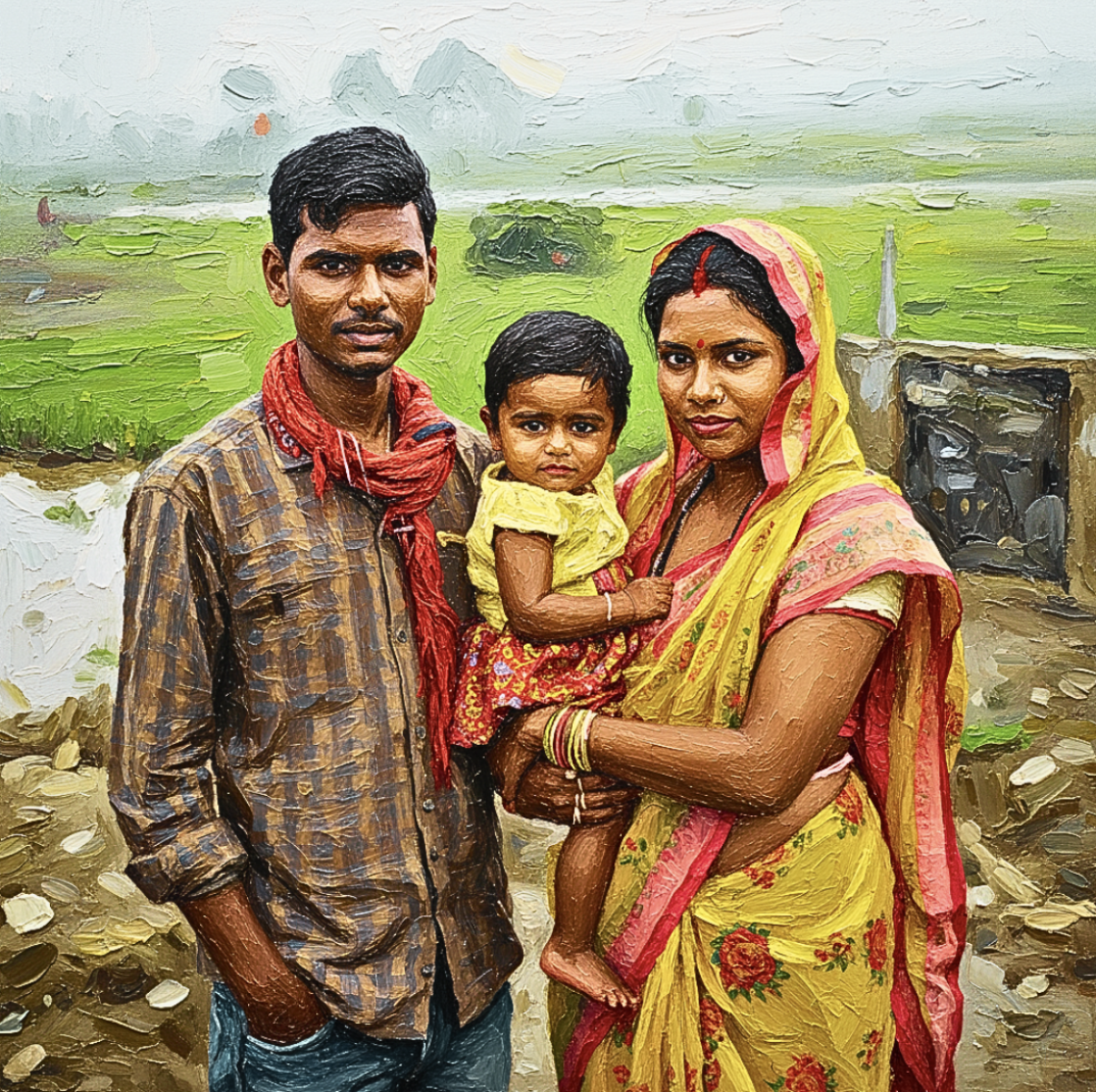Make your 2X MATCHED gift today!
This week only: Every $1 will be matched with $2 to enable women worldwide.
This week only: Every $1 will be matched with $2 to enable women worldwide.
Posted on 11/12/2025

Over 12 months, we interviewed 30 couples to better understand the challenges facing smallholder farmers today. This is the third in a series of blogs based on those interviews. Names and faces have been changed to protect privacy. Photo has been AI generated.
Living in a multi-generational household with aging parents and young children, Kabir and Avani speak openly about their challenges as small-share farmers. “I am not proud of it, it’s a very problematic job,” says Kabir, 37. “There is nothing to be proud about. See everywhere, the one who has to sacrifice the most is the farmer.”
Hot, long hours in the sun, unpredictable financial outcomes, and labor shortages are just a few of the challenges the family faces. Last year, animals destroyed their efforts to grow green and black gram beans, and they were unable to produce a successful sugarcane crop to sell jaggery, limiting their crops to rabi and kharif.
For Kabir, farming is simply a means to support his family, and since the farm is not enough to cover expenses - particularly medical expenses for his parents and the children’s educational fees - the family relies heavily on money sent from his brother who works a salaried office job in the city. “I would like to do some business,” he says, and continues to look for alternate income sources, including commercializing the family farm.
For Avani, 31, the responsibility of managing the home, children and her aging in-laws is complicated. On the one hand, she appreciates being part of an extended family. “There are other people at home to keep an eye on my baby while I am working,” she explains. “I can do all the work with the help of the other family members.” And yet, when asked later if there were areas in her life in which she would like less responsibility, she concedes, “Cooking, managing children, and taking care of parents are all tasks I handle simultaneously, which is challenging. I don't want to do that.”
The couple - both well educated - have three young daughters, and both parents agree that their children’s future depends on getting an education. “I intend to provide them with a good education and will have them pursue their interests,” says Kabir Kumar. His wife agrees; “The daughters are good at studying and will do well.”
They talk about the complexity of being a woman in a traditional farming community during modern times. Despite Avani’s education, she has no decision-making power on the family farm - decisions are made by her husband and in-laws - and although she has been invited to attend the local FPO meetings, she has never gone. “Yes, they invited me to the meeting but I didn't go, as I don't go outside anywhere,” she explains. While Avani believes that women should be allowed to work outside the home, she describes these jobs as “sitting jobs” and does not think women should be out farming alongside the men: “Women can't work the same way men do. I don't think there is any (farm) work that is particularly meant for women.” Avani continues, “We all work in tandem. We manage the household chores altogether. So, that is not an issue.”
Her husband is more open to the idea of women contributing in diverse ways: “In my opinion, if (women) are going out and supporting the family it is good,” he begins. “I would say they should come together and help each other. Yes, in jobs and farms - both ways - if the females stay ahead then it is good. Wherever females feel comfortable and they have safety, in such fields they should work."
The reality is, Avani’s days are full just managing the family and running the home, and, according to Kabir, modern improvements like their gas cylinder stove only create more work and higher expectations for his wife. “Instead of eating one meal a day, people eat two meals a day,” Avani explains. But she sees this as a positive change, adding that women’s clothing has also improved in recent years; “Earlier, women used to wear only one or two saris, but now they wear saris, suits, and everything.” Furthermore, she adds, “Now men pay more attention to children and look after their food, clothing, and so on.”
Despite these improvements, Avani still sees the limitations of women in her world: “Today’s women are educated and work, but despite their education, they can’t do as much as women did earlier.” Kabir adds, “Earlier, people had a sense of love and affection, but that is no longer present; now people are busy with work. The scope of thinking has become somewhat limited and people prefer to have smaller families.”
As for their own family, Kabir and Avani continue to worry for the future, knowing that the farm will not produce enough to support their educational goals for their daughters and the ever-mounting medical bills for their parents. “Without money, we cannot achieve anything,” Avani says.